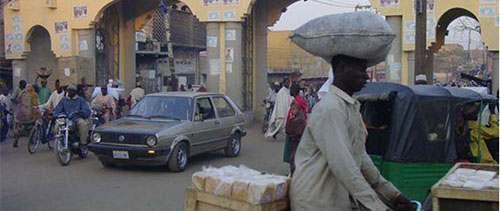New forms of popular transport of goods and persons in Nigeria

The French Institute for Research in Africa (IFRA) Nigeria (Ibadan), Sciences Po (Paris), Mambayya House, BUK (Kano) and Columbia University (New York) invite applications for 16 young researchers on our jointly taught research masterclass, to be held at Mambayya House, Kano, from July 2nd to July 7th, 2018.
The masterclass is aimed at PhD students in Social Sciences and Humanities at the beginning of their doctoral studies (1st or 2nd year), who have not yet finished conducting their fieldwork, and at students finishing a research master’s degree and planning to continue with doctoral studies.
This masterclass will train students in intellectual questions, methods, and writing strategies relevant for their future careers. Students will engage in reading seminars and firsthand research with the goal of writing a short analysis, which will be published online.
The fact that the masterclass focusses on methodology and is organized around a single topic, does not mean applicants’ own research must be focussed on this topic. We invite applications from students from all regions of Nigeria and whose research is generally engaged with questions of urbanism in the Social Sciences and Humanities.
Theme
The precariousness of work has become dominant in most of African economies after structural adjustment. Formal employment has been replaced with a far more amorphous, more lowly paid, insecure, casualized work – often self-employed petty jobs with erratic earnings. This is especially the case in transport which use to be governed by public authorities and which are now dominated by an increasing number of private operators. The masterclass will focus on the emergence of new forms of popular transport in a context of massive precariousness and what this tells us about changes in the nature of work and the future of Nigerian urbanization. Questions may include: Is today’s urban transport a form of self-organization and creative entrepreneurship or precarity and predation? How are transport systems organized? Why is it that transportation has become the symbolic for whether Nigerian cities are ordered or disordered? How does gender – particularly in the wake of shari’a law – structure the development of contemporary transport systems? What is the role of emerging online apps in the future of transport? And, in what ways do cars, buses and motorcycles offer sites for the development of new forms of popular culture?
Programme
Day 1: Monday
- Morning: Seminar exploring intellectual questions dedicated to fieldwork. Oriented around one article
- Afternoon: Seminar exploring intellectual questions dedicated to workshop theme. Oriented around one article
- Evening: Dinner, party.
Day 2: Tuesday
- Morning: Seminar exploring intellectual questions dedicated to workshop theme. Oriented around one article in which we examine in detail how the scholar develops evidence from which she/he then makes her/his intellectual intervention.
- Afternoon: Workshop is broken up into groups (choice of sub-themes and fieldwork places)
Day 3: Wednesday
- Field research
Day 4: Thursday
- Morning: each group presents its findings during we draw out the intellectual implications of these data. Students are assigned short - c1000 word - posts that draw upon primary research and relate that research to intellectual questions about the workshop theme.
- Afternoon: Students go back to the field to complete the data collection, according to the feedbacks they get in the morning
Day 5: Friday
- Morning: Writing. Presentation of drafts (til 12noon, then prayer)
- Afternoon: Free time
Day 6: Saturday
- Morning: Detailed feedback on first drafts for revision.
- Afternoon: Final revisions
Participation
16 students will be selected for the masterclass. Application is open to new doctoral students (in their first or second year) and to students finishing a research master and planning to continue with doctoral studies, from any Nigerian university. Applicants should write a 2 page statement outlining background, interests and why you wish to take part in the workshop. This must be emailed along with a CV, list of courses taken and grades received, and a letter of reference to This email address is being protected from spambots. You need JavaScript enabled to view it. before the 10th of June, 2018. It is mandatory for all applicants to be registered as IFRA research fellows (registration form available here).
Results will be announced on June 13th on IFRA website.
Transportation, accommodation and food will be covered by the organizers of the masterclass.

Social Media
Mailing List